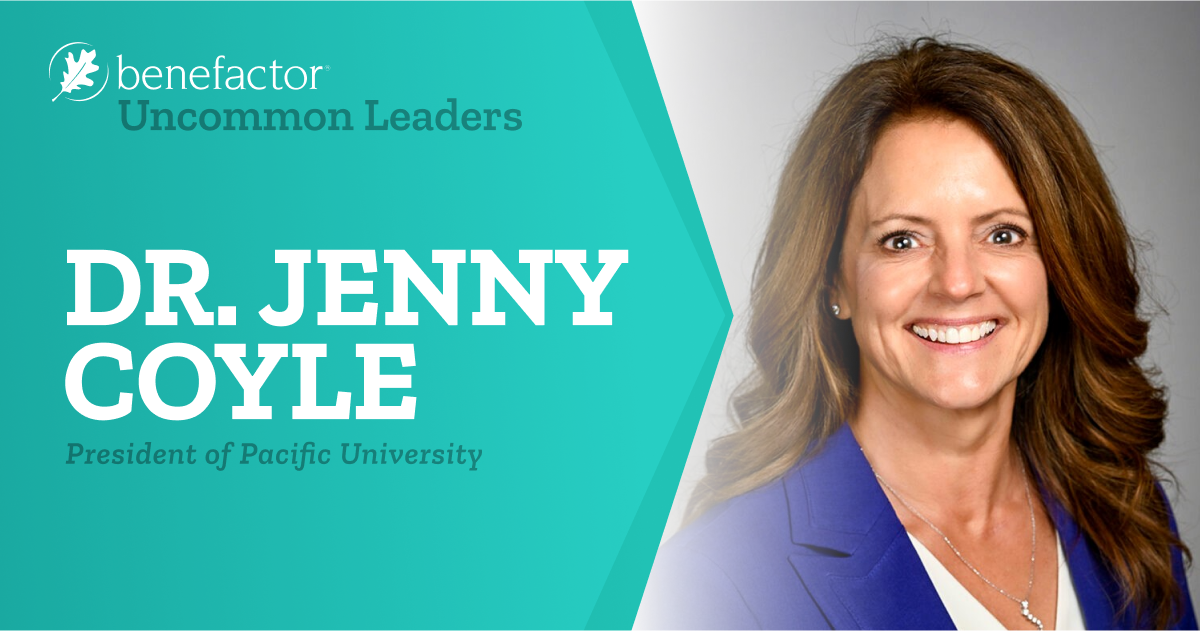Author’s Note
Good leadership is easy to spot but hard to define. Popular idioms point to leadership as influence, or hope, or the ability to translate vision into reality. Some leaders are characterized by charisma, others by quiet acts of service. And debate continues over their origin: born, made, or something in between?
Benefactor Group is proud to work with leaders of all styles and backgrounds. Through this interview series, we have asked a number of our partners, past and present, to share their personal leadership philosophies and career journeys. We found each conversation illuminating—and have shared their varied accomplishments, trials, and lessons learned below.
About Dr. Jennifer Coyle
Dr. Jennifer Coyle—or Jenny, as she prefers—is the 18th president of Pacific University. Jenny has nearly 30 years of experience in higher education, healthcare, and leadership. She also has deep and lifelong ties to Pacific, as an alumna (for her undergraduate, graduate, and doctoral degrees), parent, and former professor and dean.
Jenny became President in 2022 and has approached the role with a thoughtful and ready eye to the future, and a focus on the university’s continued growth and enrichment.
Q&A with Dr. Jennifer Coyle
Tell me your origin story. What led you to this point in time?
When I was an undergraduate, I transferred to Pacific, which for me was absolutely the right thing to do. During my time, I was so inspired by one of our faculty. I wanted to learn everything I could from her. So, I stayed. I was a faculty member for 16 years in the College of Optometry, then associate dean, then dean. There was a brief moment when I considered leaving academia. But during that uncertain period, I remember attending one of our undergraduate convocation ceremonies. And at that moment, I knew: this is where I belong. This is what I need to do.
I’ve been lucky at Pacific. There have always been opportunities. And I believe in the mission, 100%.
Someone inspired you to pursue academia. Was this kismet, or do you think your path would have led you here anyway?
I met this faculty member early on in my second year of optometry school. I was her teaching assistant. I couldn’t imagine doing anything else. When people talk about the transformational experience a faculty member can have…I had that. It was as if a whole new world opened up that I didn’t know existed: researching, shaping the future of a profession, and gaining such an understanding of a topic you can explain to somebody else. I was so inspired. I wanted to change the world.
“And at that moment, I knew: this is where I belong. This is what I need to do.“
How do you help the students—or others—understand that this can be a transformational experience when it may not feel that way?
The mission makes a difference. Inspiring students is key to our mission. My goal is to inspire students to practice what we call “behavioral optometry.” It’s an ethos, an internal drive. It’s helping students develop that drive—and also helping higher education leaders recognize that students learn differently; they find that drive differently.
In your role, you are a few degrees of separation from students. How do you instill that passion in them?
In my position, I have a microphone. I’m often talking, and so I choose to talk about impact. Every single person, no matter what role they play, can have an impact. My job is to highlight that impact for them…or maybe uncover it in a way that they didn’t think about.
“And often, the greatest leaders—those connected with the who and the why—were willing to take risks. They do what needs to be done, even if it’s uncomfortable.“
How do you decide who’s on the Pacific team?
We have a strategic objective around communication and collaboration. So, we provide opportunities for people to self-select. But we also acknowledge that this isn’t for everyone. We try to be authentic, but we can’t be everything to everyone. It has to fit in with your value system, or your internal drive to be mission focused. If we can help our employees be successful and they end up leaving Pacific for something great, then I’m proud of them. If we played a role in them finding their bliss, well, that’s part of our mission.
Was there a moment you realized, “I am a leader?”
It was a slow boil. There came a point where there wasn’t a day that went by where I wasn’t asked to do something outside my role—join a committee, lead a project, or provide a lecture. But I didn’t realize I was a leader until I looked externally. I was looking through a list of all the optometry organizations and realized I was involved in a leadership capacity for all but one. And these were my volunteer jobs, not my day job! Internally, I would say the convocation was probably my “leader moment.”
What do you see as the qualities of a great leader?
The leaders I try to emulate are those who get to know the who and the why first. That’s the most important part. The what and the how fall into place after. Great leaders understand who they’re leading, what motivates these individuals, and why the organization is there—and tap into that. They understand how to connect the dots between those people.
And often, the greatest leaders—those connected with the who and the why—were willing to take risks. They do what needs to be done, even if it’s uncomfortable.
Can you think of a time when you were courageous, or felt courageous?
I’ll tap into a very courageous act of one of my predecessors—what we called the “hold your breath” moment. This was Phil Creighton, the president of Pacific who appointed me dean. Opening a campus in Hillsboro, starting the College of Health Professions, and taking on debt was a very courageous act. In the end, it was right. We are weathering storms others are struggling with because we have that program diversity. I’ve only been in this role as President for 20 months—but I know I’ll soon be approaching those moments of courageousness too.
Are leaders born or made? Is it nature or nurture?
I was the kid who would follow the leader, but I was always taking care of everybody around me. So, I don’t think I was born a leader, but that I was built. I think my experience growing up in Alaska was a big part of that as well.
More often than not, I think I make the right choices for the right reasons—and those reasons are usually about the people.
How did you build your leadership skills?
I think you have to have some failures and survive them, and that’s what I had as a child, a teenager, and definitely as a graduate student. I also think it’s about accountability—I want to get things done. We all have a lot on our plates, but let’s make sure we accomplish what we need.
Is leadership a skill you can improve? If so, what do you do?
I read a lot about higher education and have dabbled in things like Courageous Conversation and Crucial Conversation trainings. I’m a big believer in networking and providing opportunities for people in similar roles to talk about shared experiences and learn from each other. I’m also an observer. I observe, I read, and I consider how what I’m studying would impact Pacific or my leadership. I’ve learned many things by making right (and wrong!) choices and then reflecting on them—trial, error, and self-reflection.
What should a leader’s role be in times of fear or uncertainty?
Be a reality checker. It’s so easy to dwell in the awful when “awful” may not even happen. I’m a big believer in first getting data and evidence, and then being authentic and consistent. I focus on the resources people and the institution need to be successful moving forward. Good leadership is not immediately jumping to the worst case but making sure we’re thoughtfully assessing possible impacts. In a crisis, be present, don’t hide.
Does leading ever take a toll on you?
I haven’t found that perfect balance yet, but what helps me is to be immersed in the outcomes. I love to watch our students thrive—at athletic events, presenting their research, singing and performing at concerts. This grounds me and balances out the heavier parts of the job.
What’s next for you? Where do you see yourself in 10 years?
I want to be here. I love this institution and I would love to end my career here. I aspire to see Pacific through all of the things we’ve talked about and to be a consistent denominator of what success will look like for the institution. When I retire, I’m looking forward to serving on boards and still staying connected with Pacific.
My Thoughts – Leadership Takeaways
I’ve worked with Dr. Coyle—Jenny—for the better part of a year. I was immediately drawn to her leadership style. That respect has only deepened as I have worked with her more. During our conversation, there were a few phrases that were indicative of her leadership style, and in my opinion, what makes a great leader in general.
- “Call me Jenny.” I’ve worked with a few university presidents in my career. I tend to put them on a pedestal and—being honest—they can be intimidating. So, we call them “Dr.” In my first meeting with Dr. Coyle, she said, “Call me Jenny.” It set the tone for who she is and what I think a great leader is: friendly, authentic, and not too serious. Though, it’s still hard to call her Jenny.
- “I’ve been lucky at Pacific.” None of us choose the circumstances we are born to, or the gifts we naturally possess. To recognize that one is “lucky” is self-aware and humble. These two qualities I’d put on my “how to lead” list.
- “I believe in the mission, 100%.” All the emotional and intellectual gifts in the world don’t amount to much if the passion isn’t there. Theodore Roosevelt said it well, “Nobody cares how much you know until they know how much you care.” And you can’t fake that—not for long.
- “I’m a big believer in first getting data and evidence.” Being an effective leader means trusting your gut, certainly, but that is only part of the equation. Great leaders bring the gut and the heart—and understand the necessity for an objective truth.
- “Know the who and the why first. That’s the most important part.” Jenny’s first thought is about people. No matter what your business is, the only true “product” is people. It’s the foundation upon which great institutions are built. If you don’t get that right, the rest doesn’t work.
- “I wanted to change the world.” Great leaders inspire. They have a big vision and the faith we can get there.





